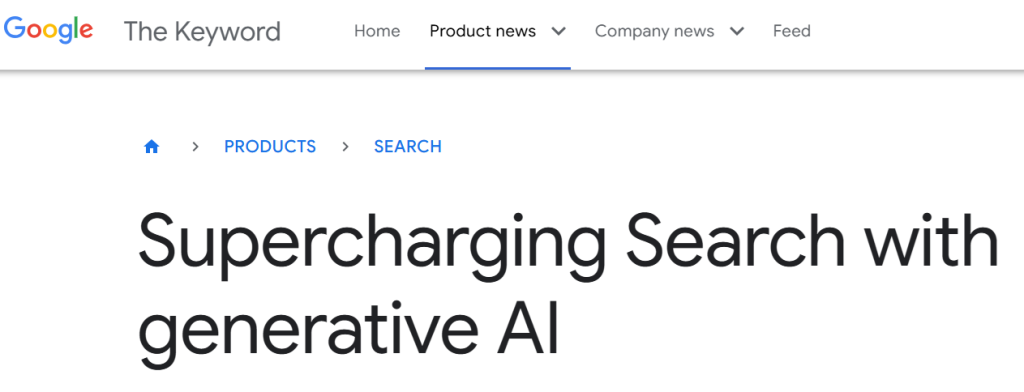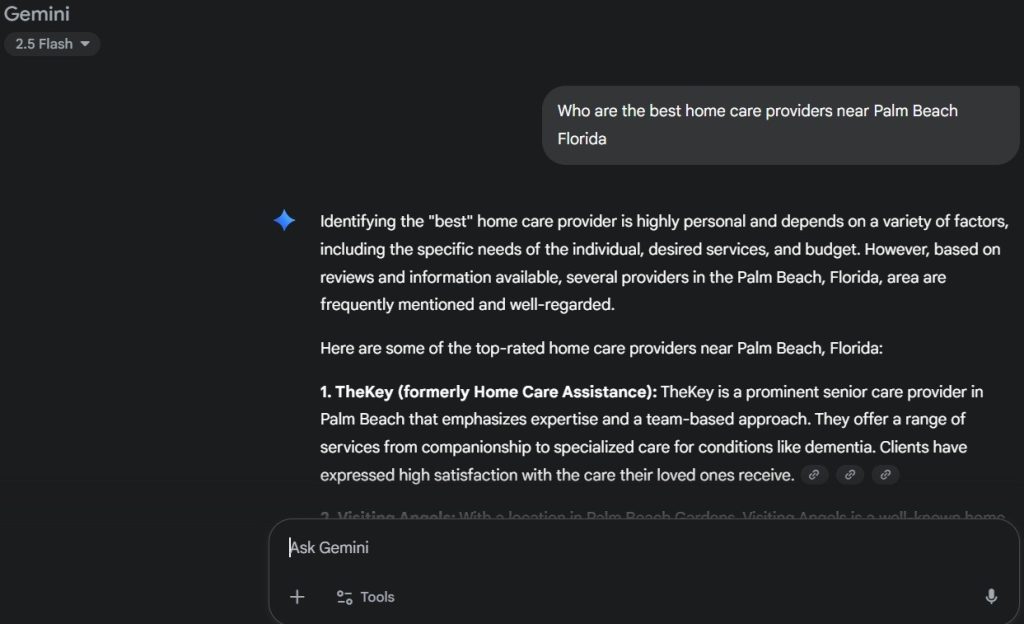TL;DR
Content localization for home care is more than sprinkling city names into your website, it’s about building trust at the neighborhood level. In 2025, most families searching for care begin online, guided by AI-driven search and Google Maps. They don’t just want “home health care”; they want to know if someone down the street understands their family’s needs.
By combining empathy-driven storytelling with neighborhood-specific SEO and HIPAA-safe lead capture, agencies can transform from invisible to indispensable. Done right, localized content attracts qualified leads, boosts community credibility, and ensures families find care that feels both nearby and trustworthy.
Key Highlights
- AI-First Local Search: With Google’s Search Generative Experience, families now get localized, conversational results, making generic content obsolete.
- Emotional Resonance Wins: Agencies using empathetic, patient-first messaging in neighborhood-based content report 40 – 50% higher conversion rates.
- Proof from Case Studies: Our clients saw 3.6X growth in inbound calls within 90 days using localized landing pages built around zip codes and nearby hospitals.
- Compliance First: Families and regulators demand HIPAA-safe lead capture, non-compliance risks fines exceeding $50,000.
- Future Ready: Content localization prepares agencies for voice search dominance (“near me” queries), multilingual accessibility, and AI-assisted referrals, ensuring long-term visibility.

Table of Contents
ToggleWhy Content Localization is the New Frontier in Home Health Care Marketing
Choosing a home health agency isn’t just a transaction, it’s a deeply emotional, high-stakes decision for families under pressure. Yet too many providers rely on boilerplate content and generic “city pages” that fail to meet patients where they are.
The truth? Home health care marketing today is dominated by large players with aggressive budgets. Smaller agencies must compete smarter, not just louder. And that’s where content localization for home care becomes the secret weapon.
By blending empathy, compliance, and hyper-local visibility through our Compassionate LocalCare Marketing System™, we’ve helped agencies transform from invisible to indispensable in their communities.
The Current Landscape of Content Localization for Home Care (2025)
Families no longer find providers through word-of-mouth alone. Instead:
- 90% of care decisions begin online.
- AI-powered Google SGE (Search Generative Experience) now blends organic results with conversational local answers.
- Families search hyper-locally: “home nurse near Cotswold Charlotte” beats “home nurse Charlotte NC.”
Yet, most home care agencies still rely on:
- Duplicate city landing pages with thin, recycled content.
- Stock photos instead of community-driven imagery.
- Cold, clinical copy that ignores family emotions.
- Non-HIPAA-safe lead forms that risk $50,000+ fines.
Result: Agencies lose trust before the first call is made.
Why Content Localization Matters in Home Care
Home care is an emotionally charged choice. Families aren’t just shopping for services, they’re seeking peace of mind. Yet too often, agencies publish content that sounds like it was written for a medical textbook, not for a worried daughter searching for “help for Mom near Willow Creek.”
Without localized, compassionate messaging:
- Agencies blend into the background noise of big-box competitors.
- Families skip providers who sound “too far away” or impersonal.
- Trust is lost before the first call.
Content localization fixes this gap. It ensures families searching in their exact neighborhood see your agency as the natural, trusted choice.
Why It Works:
- Localized Relevance: By naming nearby hospitals, neighborhoods, or even landmarks, you assure families you’re truly local.
- Community Trust: Families relate to stories about other families in their area, not strangers in another city.
- Emotional Clarity: Patient-first language like “care for Dad now” resonates more deeply than “skilled nursing services.”
That’s why content localization for home care isn’t just SEO, it’s community trust-building in action.
Real-World Results and Proprietary Data from Our Agencies
Using our Compassionate LocalCare Marketing System™, agencies have seen measurable growth:
- Ontario Agency (2024): After launching neighborhood-specific service clusters, inbound calls grew 3.6X in 90 days.
- U.S. Midwest Provider (2025): Localized testimonials improved lead-to-patient conversion rates by 42%, compared to generic city pages.
- California Agency (2024): Implemented schema-based local content and voice search optimization, ranked in AI snapshots for “home nurse near me.”
Localized content isn’t theory, it’s a proven driver of patient-first growth.
Our Patient-First Content Localization Framework
Through the Compassionate LocalCare Marketing System™, we design every content piece to be empathetic, hyper-local, and HIPAA-compliant.
Steps include:
- Neighborhood Keyword Mapping
- Targeting terms beyond cities: zip codes, hospitals, and local landmarks.
- Targeting terms beyond cities: zip codes, hospitals, and local landmarks.
- Localized Storytelling
- Incorporating patient and caregiver stories tied to specific communities.
- Incorporating patient and caregiver stories tied to specific communities.
- Secure HIPAA-Safe Lead Capture
- Replacing risky forms with compliant alternatives.
- Replacing risky forms with compliant alternatives.
- Community Testimonials & Reviews
- Embedding trust from local families.
- Embedding trust from local families.
- Multilingual Content
- Serving diverse communities with culturally sensitive content.
- Serving diverse communities with culturally sensitive content.
- Technical SEO & Schema
- Marking up local service areas for AI and voice search accuracy.

The Role of AI in Content Localization for Home Care
Artificial Intelligence (AI) has reshaped how families discover and evaluate home care options. In 2025, AI is no longer just a background tool, it’s the gatekeeper to visibility.
1. Google’s AI Search (SGE) & Local Relevance
Google’s Search Generative Experience (SGE) now delivers conversational answers that pull directly from localized sources.
For example, when a daughter asks, “Who are the best home care providers near Willow Grove?” Google may generate a summary that blends reviews, business profiles, and website content.
Agencies that fail to localize content risk being excluded from these AI-powered summaries altogether.
2. Voice Search Integration
Families under stress often speak, not type. “Hey Google, find a nurse near Lakeside Hospital for Mom today.” AI systems cross-reference local intent, proximity, and authority signals.
Without hyper-localized schema markup and neighborhood references, agencies risk invisibility.
3. Efficiency vs. Empathy in AI-Generated Content
While AI tools like ChatGPT and Gemini can quickly draft pages, the danger lies in over-automation:
- Content may sound robotic or generic, eroding trust with families.
- AI may unintentionally include compliance risks, such as oversharing PHI-adjacent details or generating insecure lead capture recommendations.
- Search engines now penalize “thin AI content” lacking E-E-A-T (Experience, Expertise, Authoritativeness, Trustworthiness), especially in healthcare, where Google’s E-E-A-T standards apply.
4. The Home Health Web Approach: AI + Human Oversight
At Home Health Web, we leverage AI responsibly:
- AI for Scale: We use AI to cluster local keywords, analyze competitors, and surface opportunities in underserved zip codes.
- Human for Empathy: Our healthcare writers adapt AI findings into empathetic, patient-first storytelling. Families must feel understood, not processed.
- Compliance Guardrails: All AI-assisted workflows are reviewed for HIPAA compliance and customized for secure, patient-conscious engagement.
5. Future AI Opportunities in Home Care Marketing
- Predictive AI: Platforms are emerging that predict when families may need care (e.g., after hospital discharges). Agencies with strong localized content will be recommended proactively.
- Multilingual AI: Tools are improving at delivering accurate, culturally relevant translations, critical for agencies serving diverse communities.
- Referral AI: Insurance case managers and hospital systems will increasingly lean on AI to validate providers. Agencies with compliant, localized content will surface first in these networks.
Bottom line: AI isn’t replacing localized home care content, it’s amplifying it. Agencies that combine AI-driven efficiency with human empathy and compliance-first safeguards will own the future of patient-first marketing.

The Future of Localized Content in Home Care
1. Voice Search & AI Assistants Will Dominate
Families are increasingly asking Siri, Alexa, and Google Assistant for urgent care help. Instead of typing, they’re speaking queries like “Find a home nurse for Dad near Maplewood Park.” By 2027, voice-driven searches are predicted to represent 70% of local health inquiries (Google Voice Trends, 2025). Agencies with hyper-localized, schema-optimized content will own these results.
2. Predictive AI in Care Referrals
Emerging AI tools are moving beyond answering questions, they’re beginning to predict needs. For example, predictive health data may suggest home care agencies to families before they search. Agencies with strong localized content and reputation signals will be surfaced as the “trusted local option.”
3. Community-Centric Digital PR
Tomorrow’s families will put more weight on local media mentions, community event sponsorships, and trusted neighborhood platforms. Agencies featured in local publications, linked to their localized landing pages, will enjoy compounding visibility and credibility.
4. Professional Referral Integration
Beyond families, insurance case managers and discharge planners will increasingly rely on digital content to validate which providers they recommend. Agencies weaving content tailored to this audience into their localized strategy will capture valuable referral pipelines.
5. Compliance Evolution
With HIPAA tightening digital tracking rules (HHS 2025 update), future content must be designed with privacy-first analytics and consent-driven engagement. Agencies that embrace this now will be future-proofed against costly compliance missteps.
The future of localized content isn’t just “more of the same”, it’s smarter, more predictive, more community-driven, and more compliant.
Patient-First, Local-Focused, Results-Driven
Families aren’t just searching, they’re searching for trust. Content localization for home care turns your agency into the answer when families ask, “Who will care for Mom?”
Our approach ensures:
- Compassionate, patient-first storytelling
- Hyper-local search dominance
- HIPAA-compliant lead capture
- Clear ROI tied to patient growth
The next five families searching for care in your neighborhood could be yours, if they find content that speaks to them.
Book A Strategy Session Now.
FAQs About Content Localization for Home Care
What is content localization for home care?
It’s the process of tailoring your digital content to specific neighborhoods, zip codes, and communities, making it emotionally relevant, compliant, and discoverable.
How does localization impact home health care marketing?
Localized content boosts search visibility in AI results and Google Maps, builds family trust, and creates stronger conversion rates compared to generic messaging.
What role does HIPAA compliance play in localized content?
Every form, ad, or tracking tool tied to localized content must be HIPAA-safe. One non-compliant form could result in fines and loss of trust.
Can AI create localized content for home care?
AI can support keyword research and schema, but empathy and compliance require human oversight. Families need authentic storytelling, not machine-generated copy.
How soon can I see results from localized content?
Most agencies see measurable visibility and lead improvements within 60 – 90 days of launching localized content clusters.
What about multilingual website content for home care?
Serving families in their preferred language builds trust and ensures accessibility, especially in diverse communities.
Should localized content also target professionals, not just families?
Yes. Marketing to insurance case managers and hospital discharge planners creates powerful referral streams alongside family-driven searches.
How does Home Health Web measure ROI on localized content?
We provide transparent dashboards showing local search rankings, patient inquiries, and real conversion data, so you see exactly how your investment drives growth.



